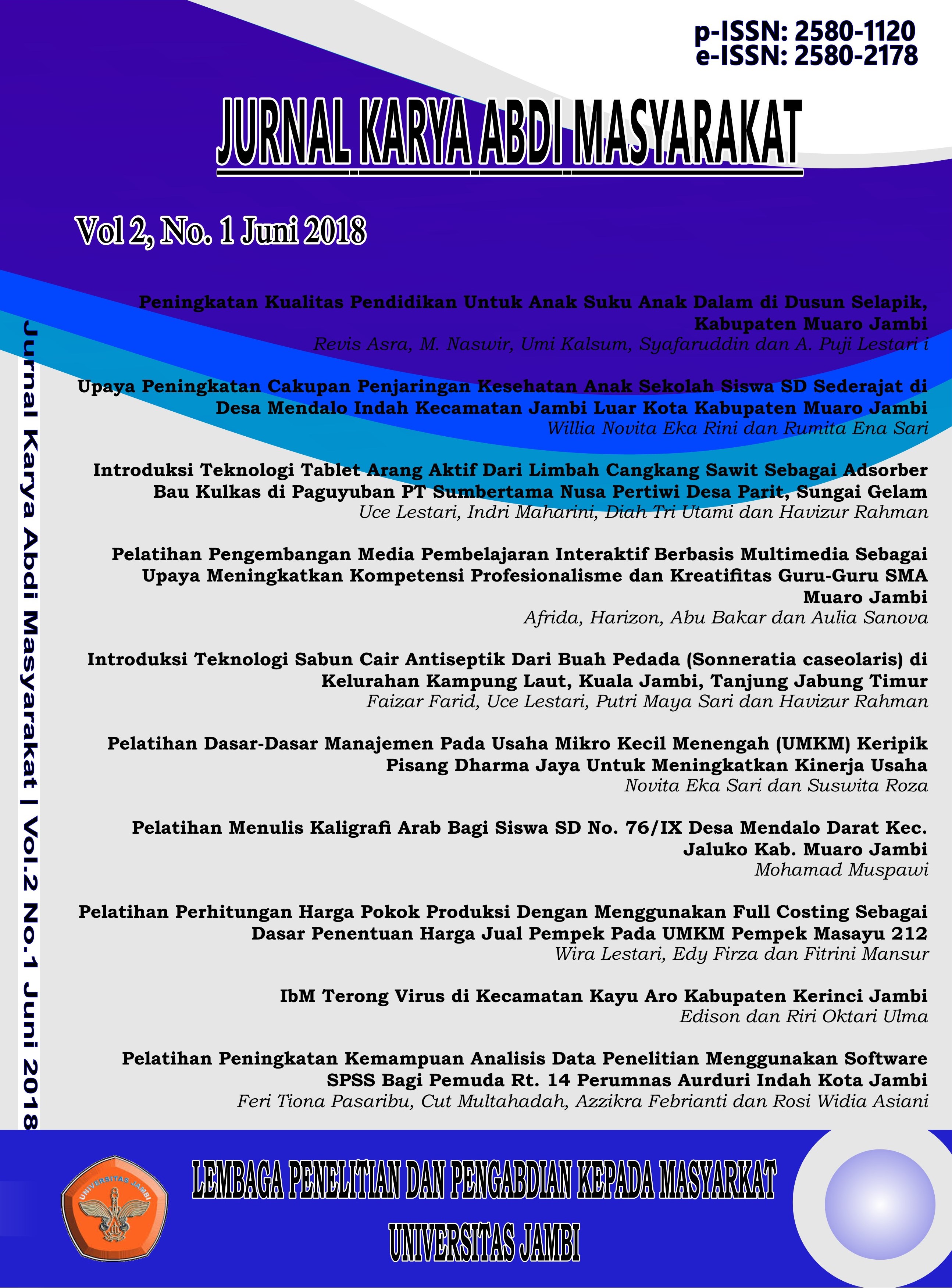Peningkatan Kualitas Pendidikan untuk Anak Suku Anak Dalam di Dusun Selapik, Kabupaten Muaro Jambi
DOI:
https://doi.org/10.22437/jkam.v2i1.5424Keywords:
Pendidikan, Anak SAD, Dusun SelapikAbstract
Dusun Selapik merupakan salah satu dusun yang masuk ke dalam Desa Nyogan Kecamatan Mestong, Kabupaten Muaro Jambi. Dusun ini merupakan tempat bermukimnya Suku Anak Dalam (SAD), yang hidup berdampingan dengan warga desa lainnya. Suku Anak Dalam di Dusun Selapik sudah bermukim permanen di kawasan dekat dengan pemukiman penduduk biasa, dan tidak berpindah-pindah, seperti kebiasaan SAD lainnya. Pendidikan bagi anak-anak Suku Anak Dalam yang berada di Dusun Selapik tidak mengikuti sekolah formal sama sekali, mereka hanya belajar di sanggar belajar “Meraih Mimpiâ€. Sanggar Belajar ini dibina oleh Karang Taruna Setempat, dan waktu belajarnya hanya 3 kali seminggu, dengan fasilitas seadanya. Berdasarkan hasil survey pendahuluan dan wawancara langsung dengan kepala Dusun Selapik diperoleh informasi bahwa masalah biaya merupakan penyebab utama yang menyebabkan anak-anak SAD putus sekolah. Universitas Jambi sebagai salah satu Lembaaga Pendidikan dan merupakan Perguruan Tinggi Negeri terbesar di Provinsi Jambi, melalui Pusat Sudi Pendidikan Masyarakat dibawah Lembaga Penelitian dan Pengabdian Masyarakat turut terpanggil untuk melakasanakan program pendidikan untuk anak-anak SAD. Metode pengabdian yang digunakan yaitu Participatory Rural Apraisal (PRA), yaitu metode pendidikan pada masyarakat.Berdasarkan hasil kegiatan Pengabdian Kepada Masyarakat tentang Peningkatan Kualitas Pendidikan untuk Suku Anak Dalam di Dusun Selapik dapat diambil kesimpulan: (1).Sosialisasi kepada Kepala Desa dan Aparat Desa telah dilakukan dalam upaya untuk mengetahui kondisi real masyarakat Dusun Selapik. (2). Penyuluhan kepada Orangtua SAD telah menggugah dan menyadarkan mereka akan pentingnya pendidikan untuk anak-anak mereka, (3) Pemberian bantuan sarana dan prasarana pendidikan kepada anak-anak SAD meningkatkan pemahaman anak-anak dalam belajar, mengaji dan praktek ibadah, (4) Kemajuan pendidikan anak-anak SAD di Dusun Selapik cukup signifikan dengan adanya kegiatan Pengabdian Masyarakat ini.
Downloads
References
2. Butet Manurung, “Sokola Rimba†Pengalaman Belajar Bersama Orang Rimba, Insist Press,
Yogyakarta, 2008
3. Hidayati, Siti. 2002. Hubungan Antara Tingkat Pendapatan, Sikap Orang Tua Tentang Pendidikan dan Tingkat Pendidikan Anak. Raja Basa Jaya. Bandar Lampung: Unila.
4. Rahmawanta, Sulis, 2013, “Bersama Masyarakat Membangun Pendidikanâ€. Jurnal Ilmu Pendidikan. Vol 1. No.2 November 2013, Halaman 12-15.
5. Sutrisno, 2013. “Memahami Anak Putus Sekolah dari Sisi Orang Tua dan Anakâ€.Jurnal Mainstream. Vol. 1 No. 2 Juli 2013, halaman 5-12
Downloads
Published
Versions
- 2018-08-21 (1)
- 2018-08-21 (1)
How to Cite
Issue
Section
License
Please find the rights and licenses in Jurnal Jurnal Karya Abdi Masyarakat (JKAM).
- License
The non-commercial use of the article will be governed by the Creative Commons Attribution license as currently displayed on Creative Commons Attribution 4.0 International License.
- Authors Warranties
The author warrants that the article is original, written by stated author(s), has not been published before, contains no unlawful statements, does not infringe the rights of others, is subject to copyright that is vested exclusively in the author and free of any third party rights, and that any necessary written permissions to quote from other sources have been obtained by the author(s).
- User Rights
JKAM's spirit is to disseminate articles published are as free as possible. Under the Creative Commons license, JKAM permits users to copy, distribute, display, and perform the work for non-commercial purposes only. Users will also need to attribute authors and JKAM on distributing works in the journal.
- Rights of Authors
Authors retain the following rights:
- Copyright, and other proprietary rights relating to the article, such as patent rights,
- The right to use the substance of the article in future own works, including lectures and books,
- The right to reproduce the article for own purposes, provided the copies are not offered for sale,
- The right to self-archive the article.
- Co-Authorship
If the article was jointly prepared by other authors, the signatory of this form warrants that he/she has been authorized by all co-authors to sign this agreement on their behalf, and agrees to inform his/her co-authors of the terms of this agreement.
- Termination
This agreement can be terminated by the author or JKAM upon two months notice where the other party has materially breached this agreement and failed to remedy such breach within a month of being given the terminating party notice requesting such breach to be remedied. No breach or violation of this agreement will cause this agreement or any license granted in it to terminate automatically or affect the definition of JKAM.
- Royalties
This agreement entitles the author to no royalties or other fees. To such extent as legally permissible, the author waives his or her right to collect royalties relative to the article in respect of any use of the article by JKAM or its sublicensee.
- Miscellaneous
JKAM will publish the article (or have it published) in the journal if the articles editorial process is successfully completed and JKAM or its sublicensee has become obligated to have the article published. JKAM may conform the article to a style of punctuation, spelling, capitalization, referencing and usage that it deems appropriate. The author acknowledges that the article may be published so that it will be publicly accessible and such access will be free of charge for the readers.














